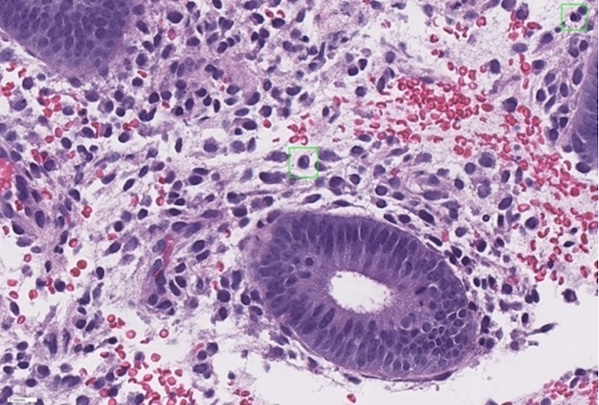Customizable AI Tool Helps Pathologists Identify Diseased Cells
June 28, 2024
Source: drugdu
 333
333
 Pathologists are tasked with examining body fluids or tissues to diagnose diseases, a process that involves distinguishing rare disease-indicating cells from thousands of normal cells under a microscope. This skill requires extensive training. Artificial intelligence (AI) can assist by learning to differentiate between healthy and diseased cells from digital pathology images. However, traditional AI tools, once trained, lack flexibility. They are designed for specific tasks, such as identifying cancer cells in one organ but not another, and might not align perfectly with a pathologist's specific needs in different scenarios. Now, a collaborative team of computer scientists and physicians has developed a new AI tool that not only identifies diseased cells but also adapts to a pathologist’s requirements.
Pathologists are tasked with examining body fluids or tissues to diagnose diseases, a process that involves distinguishing rare disease-indicating cells from thousands of normal cells under a microscope. This skill requires extensive training. Artificial intelligence (AI) can assist by learning to differentiate between healthy and diseased cells from digital pathology images. However, traditional AI tools, once trained, lack flexibility. They are designed for specific tasks, such as identifying cancer cells in one organ but not another, and might not align perfectly with a pathologist's specific needs in different scenarios. Now, a collaborative team of computer scientists and physicians has developed a new AI tool that not only identifies diseased cells but also adapts to a pathologist’s requirements.
Developed at Stanford Medicine (Stanford, CA, USA), the tool, named nuclei.io, functions like a human assistant that evolves with feedback. Starting with the basic function of recognizing different cell types by their nuclei, which house genetic material, the tool is designed to improve through interaction. Within an hour of use, nuclei.io can learn to identify the specific cells of interest to a pathologist, enhancing both the speed and accuracy of their work. During its initial trials at Stanford Medicine, the tool demonstrated its ability to speed up and enhance the diagnostic processes, reducing the time and increasing diagnostic accuracy.
In practical tests, where Stanford pathologists used the tool for tasks such as identifying immune cells in uterine biopsies for endometritis or detecting colon cancer cells in lymph nodes, nuclei.io reduced diagnostic times significantly—from 209 seconds to 79 seconds. The AI assistance made the pathologists 62% faster and 72% more accurate in their diagnoses. It is important to note that nuclei.io does not aim to replace the pathologist but rather guide them more efficiently to areas requiring detailed examination. This is part of a broader aim to ensure patients receive rapid and accurate diagnoses. Stanford Medicine pathologists are continuing to evaluate the tool’s effectiveness on a range of diseased cells, showcasing its potential to become a versatile aid in pathology.
“As we face a growing shortage of pathologists, AI tools that work in tandem with doctors have the potential to speed up some of the more tedious, time-consuming parts of our job,” said professor and chair of pathology Thomas Montine, MD, PhD. “One of the strengths of nuclei.io is that it is agnostic to application. This can be a powerful tool for interpreting any biopsy where we are trying to differentiate healthy and malignant cells. That’s not true of any other major AI tool being used in pathology right now.”
Source:
https://www.labmedica.com/pathology/articles/294801650/customizable-ai-tool-helps-pathologists-identify-diseased-cells.html
Read more on
- China Sino Biopharmaceutical Signs Exclusive Licensing Agreement with Sanofi for Rofalcitinib March 4, 2026
- Gan & Lee Pharmaceuticals’ new PROTAC drug GLR2037 tablets have been approved for clinical trials to enter the field of prostate cancer treatment March 3, 2026
- AideaPharmaceuticals plans to raise no more than 1.277 billion yuan through a private placement to focus on the global clinical development of innovative HIV drugs March 3, 2026
- Giant Exits! Its Star Business Acquired March 3, 2026
- Focusing on cardiovascular and cerebrovascular diseases! OpenMediLead Medical Intelligence Dual Engines Launch Internal Testing, Connecting Drug Development and Clinical Diagnosis in a Closed Loop March 3, 2026
your submission has already been received.
OK
Subscribe
Please enter a valid Email address!
Submit
The most relevant industry news & insight will be sent to you every two weeks.



